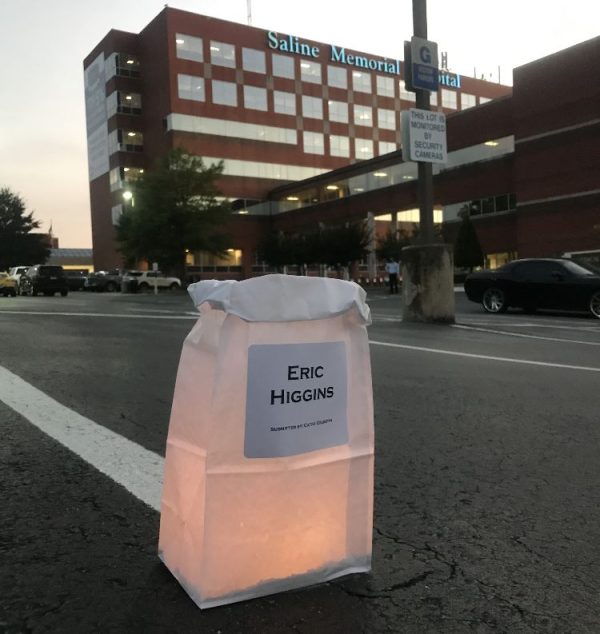
For Suicide Prevention Month, the hospital will host a luminary on their Facebook page at 7pm, Sept. 26. Submit the names of loved ones lost to suicide at this link.
Eric Higgins was one of those energetic kids who loved entertaining people. As a child, he would make other customers laugh while standing in the checkout line of a store by reading the National Enquirer’s headlines out loud in his most dramatic voice. As he got older, he learned to play guitar and loved playing 1970s rock music, especially “Stairway to Heaven.”
He was also very smart. He would take apart anything he could get his hands on, even appliances, and then put them back together, so he could get a better understanding of how they worked.
Cathy Celestin remembers all of these wonderful things about her son: his humor, his intelligence, his love of music. She will also never forget the grief and emptiness she felt when he took his own life at the age of 15.
“This was a moment that completely affected my character and who I am,” Celestin said. “It taught me to value every minute because you might not have another one.”
Celestin is not alone in her grief. In 2022 alone, 49,000 people died by suicide in the United States, according to the Centers for Disease Control and Prevention. That is one death every 11 minutes.
Each death affects the health and well-being of surviving family, friends, neighbors and the greater community. When people die by suicide, the people around them often experience a range of difficult emotions, like anger and guilt, and may even have thoughts of suicide themselves.
“If you think suicide just affects you, and the world is better off without you, it’s not,” Celestin said. “There’s a hole left when you leave.”
Michelle Rispoli, director of the Saline Memorial Hospital Behavioral Health Unit, said no one should feel they have to carry the guilt over a loved one’s suicide, and that help is available for those struggling with this type of loss.
“There is no way to fully understand what people are thinking and what they are coping with,” Rispoli said. “Sometimes tragedies happen that are beyond our control, and even if we would have done or said something different, it may not have changed the outcome.”
However, knowing the signs and risk factors can help communities work together to reduce the prevalence of suicide, she said. According to the American Foundation for Suicide Prevention (AFSP), some of the most recognizable signs of potential suicide include the following:
- Drastic changes in behavior or exhibiting entirely new behaviors
- Comments about killing themselves, feeling hopeless, having no reason to live, being a burden to others, feeling trapped or being in unbearable pain
- Increased use of alcohol and drugs
- Withdrawing from activities or isolating from family and friends
- Sleeping too much or too little, often causing extreme fatigue and/or aggression
- Giving away prized possessions and other impulsive behavior
- Looking for a way to end their life, such as searching for suicide methods online
While risk factors vary, there are some common traits among individuals who fall victim to suicide. They include the following:
- A family history of suicide or other serious mental health conditions, like depression, bipolar disorder, schizophrenia and more
- Substance abuse
- Access to lethal means, including firearms and drugs
- Serious or chronic health conditions, especially those that cause extreme physical pain
- A history of childhood neglect, trauma or abuse
- Gender (more women attempt suicide, but men are four times more likely to die from their attempt)
- Age (those younger than 24 years old and older than 65 years old are at higher risk);
- Isolation and/or agitation
- Prolonged stress, such as harassment, bullying, relationship problems or unemployment
- A recent tragedy, loss or stressful event, like rejection, divorce, financial crisis or other major life transitions
In recognition of Suicide Prevention Month, the hospital is hosting a luminary lighting ceremony on the Saline Memorial Hospital Facebook page at 7 p.m. Thursday, Sept. 26. Community members can submit the names of loved ones who have been lost due to suicide at SalineMemorial.org/SuicidePrevention for inclusion in the ceremony.
Saline Memorial Hospital provides many behavioral health support services, including individual therapy, medication management and group counseling. Additional information is available at SalineMemorial.org/Behavioral-Health or via phone at 501.776.6600 or 501.776.6643. Free and confidential emotional support is also available 24 hours a day, seven days a week to those in suicidal crisis or extreme emotional distress by calling the Suicide and Crisis Lifeline at 9-8-8.
“If you or someone you know is struggling with a mental health condition, like depression, or exhibiting these warning signs and risk factors, please seek help immediately,” Rispoli said. “Our hope is that anyone struggling with depression, or any other form of mental illness, knows that it’s okay to seek help, and we’re here whenever they need us.”
Saline Health System, a part of Lifepoint Health, is made up of Saline Memorial Hospital, a 177-bed acute care facility, and Saline Clinics, a network of primary care and specialty care clinics. The hospital is accredited through The Joint Commission for meeting quality and safety standards, the American College of Cardiology as a Chest Pain Center with Primary PCI, the MBSAQIP as a bariatric surgery center, Optum in the Bariatric Centers of Excellence network, CARF as a rehabilitation center and the AASM as a sleep center. For more information about Saline Memorial Hospital, please call 501.776.6000 or visit SalineMemorial.org. For more information about Lifepoint Health, visit LifepointHealth.net .




